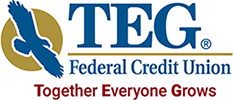Beware of Mystery Shopper Check Scam
Mystery Shoppers And Counterfeit Checks Scam
“You have been selected to participate in a paid survey Mystery Shopper program. Here is your check,” says the letter you just opened.
You look at the check. Sure enough, your credit union’s logo, name and address appear on it. It has to be real. After all, mystery shoppers and secret shoppers exist. Unfortunately, so do counterfeit checks and scams. How can you tell this is a scam? First, and most obviously, a legitimate secret shopper program won’t send you a check before you complete your assignment. Additionally, secret shopping is not a high-paying profession. Most of the time, it exists as a part-time opportunity, so be aware of any large amounts in such checks.
Unfortunately, we have seen an increase of counterfeit TEG checks such as these. In the most recent cases, the letter asks you to cash the check for funds needed to complete the assignment. Once the check is cleared they want you to call back for instructions. They then ask you to pose as a mystery shopper and purchase new gift cards or ask you to send money by Western Union.
How can you tell the check is counterfeit? Especially when it looks so real, thanks to copying logos, using high-quality ink and paper, and even replicating the watermark. The address information for the credit union is correct; the routing number is, too. The best option for you is to call TEG directly (845-452-7323) to verify that the check is accurate. But don’t trust a phone number listed on the “cashier’s check.” It may also be (and probably is) fraudulent.
Legitimate secret shopper or mystery shopper programs do exist. To help make sure you are working with a legitimate one: Avoid programs that contact you by email, require you to pay for “certification,” guarantee you a job, charge you a fee or ask you to wire money from a cashed check.
If you do find yourself on the receiving end of a counterfeit check that is claiming to be from our credit union, regardless of the scam, please contact us directly as well as the U.S. Postal Inspection Service and the Federal Trade Commission.


